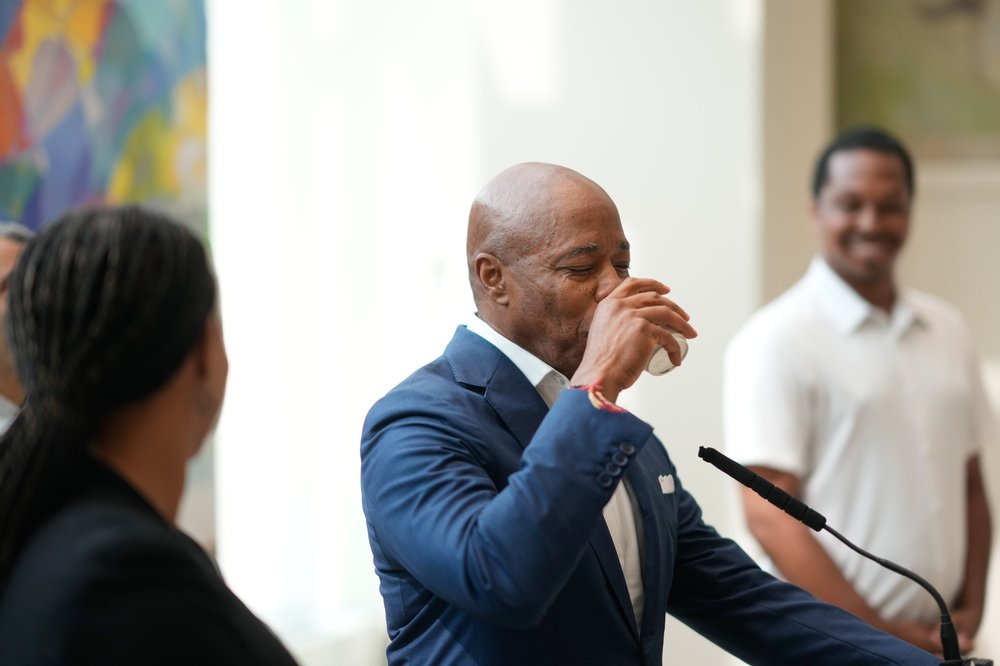Legionnaires’ outbreak revives questions about Mayor Adams’ response to health crises
Aug. 21, 2025, 9:38 a.m.
Health experts who fought a 2015 outbreak were deeply troubled that another occurred a decade later.

This column originally appeared in The Politics Brief, our weekly newsletter on the people, power and policies that shape New Yorkers' lives.
Sign up to get the full version where you can ask questions, share news tips and weigh in on the conversation. Hits inboxes on Wednesdays.
New York City just endured the second-worst outbreak of Legionnaires’ disease in its history — and Mayor Eric Adams is facing renewed criticism about his management skills and ability to respond to an emergency.
Legionnaires’ inspections of cooling towers fell to a post-pandemic low earlier this year. Now, five people have died and 109 have become sick. The city’s Department of Health and Mental Hygiene attributed the drop in inspections to staffing shortages.
But health experts who fought the 2015 outbreak — which was the worst in the city’s history, with 16 dead and 136 sick — were deeply troubled that another occurred a decade later.
“This was avoidable,” said Dr. Don Weiss, a former city health official who helped coordinate responses to infectious disease outbreaks. “We know how to prevent Legionella outbreaks.”
“I thought we had set something up so that it wouldn’t happen again,” he added.
Chris Boyd, a former assistant commissioner at the health department who helped write the regulations in the wake of the 2015 outbreak, said monitoring the city’s roughly 5,000 cooling towers is critical to public safety because they are natural breeding grounds for Legionella bacteria.
“Cooling towers are health and safety systems,” he said. “New York City is having to wade through the grief and harm of more than 100 of its residents becoming ill and five dying from a preventable exposure to Legionella.”
Dr. Jay Varma, the former deputy commissioner for disease control at the health department who also worked on the city’s response in 2015, lashed into the Adams administration over the drop in inspections in a LinkedIn post.
“Public health regulations don’t implement themselves,” he wrote. “They require investment by government in ensuring people and organizations follow them.”
“COVID created a backlash against government and a push for austerity,” he added. “As we learn over and over again, if we invest in public health, we improve health, safety and longevity. If we don’t, we get outbreaks.”
(Varma, who advised Mayor Bill de Blasio during the pandemic, arguably contributed to that backlash after it emerged last year that he spoke about participating in sex parties during the pandemic while publicly encouraging people to avoid social gatherings.)
Adams previously faced criticism for being slow to alert New Yorkers and provide information about flooding and an air-quality crisis. His health department scrambled to reopen sexual health clinics amid a 2022 outbreak of mpox.
In a sign of a brewing political storm, the City Council plans to hold hearings next month on the administration’s response to Legionnaires’.
On Wednesday, mayoral candidate Andrew Cuomo called for the state to launch an investigation into the city’s handling of Legionnaires’ before and after the outbreak.
The Rev. Al Sharpton and Ben Crump, a prominent civil rights attorney, announced a lawsuit against contractors they allege did not protect them from the outbreak.
Attorney Jory Lange said he represents 44 people and plans to file a lawsuit after the city determines which building was the source of the outbreak. In a twist, four of the 10 buildings that tested positive are owned by the city.
“If I were a resident of Harlem, I’d be outraged,” said City Councilmember Lincoln Restler, who worked as a de Blasio aide during the 2015 outbreak. “The consistent mismanagement we’ve seen from Mayor Adams is unacceptable.”
Asked Tuesday about the lapses in oversight of cooling towers, Adams said the city had “clear procedures on inspection.”
But he suggested more frequent testing of cooling towers — which experts have recommended — might not be helpful.
“I use the analogy of COVID,” Adams said during an unrelated press conference. “You can test negative for COVID in one hour. The next hour you have it.”
Listen here
We want to hear from you
Who do you believe is best positioned to manage City Hall’s relationship with President Trump’s White House: Andrew Cuomo, Mayor Adams or Zohran Mamdani?
We'll share responses in next week's newsletter. (Sign up!)
This week in New York politics
- How did the death of a cowboy-hat-wearing squirrel upstate become an issue in last year’s presidential race — and upend the enforcement of New York's wildlife and environmental laws? Read our investigation and listen to the story on NYC NOW.
- New York state is planning to send out $400 “inflation rebate” checks this fall. Here’s why progressive lawmakers now say it’s a fiscally irresponsible move.
- Mayor Adams is celebrating an ongoing drop in 311 rat complaints, crediting his trash containerization initiative for the turnaround.
- Mayor Adams is not celebrating the MTA’s planned fake hike — but there’s even less he can do about it now that one of his MTA board appointees has resigned.
- Rep. Ritchie Torres, once one of Gov. Kathy Hochul’s harshest critics, has changed his tune.
- Rep. Hakeem Jeffries has not changed his tune on Zohran Mamdani since the assemblymember won the Democratic mayoral primary, saying Mamdani still has work to do to win over his constituents in Central Brooklyn. (Gov. Hochul, however, has warmed up to Mamdani … a little bit.)
- Should Mamdani be allowed to live in a rent-stabilized apartment considering his six-figure income? We asked his neighbors.
- New Jersey currently has 33 large-scale, shovel-ready solar projects that are now on the brink of dying due to cuts from the Trump administration.
- Gov. Hochul and other elected officials are condemning the deportation of a young girl who was detained by ICE at immigration court in Lower Manhattan last week.